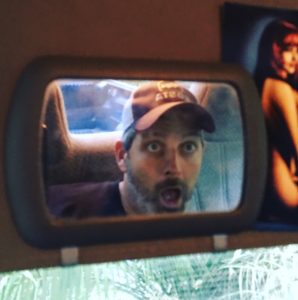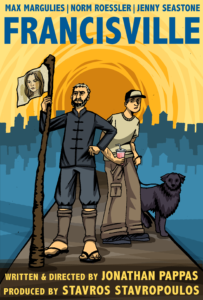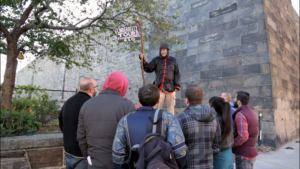Showcase Filmmaker Spotlight: Jonathan Pappas
Showcase Filmmaker Spotlight: Jonathan Pappas
By Travis Trew, Programming Associate

Jonathan Pappas is a fiction writer and filmmaker who teaches in the English Department at the Community College of Philadelphia. He’s co-produced and co-written films by Explosive Bolts Films (aka the creative duo Josh Crockett and Kristin Slaysman), including the short Dogsbody and the feature Dr. Brinks & Dr. Brinks, which recently premiered at the Maryland Film Festival. His short Francisville is an offbeat comedy about a lovesick slacker named Billy who’s taken under the wing of a cynical tour guide of Philadelphia’s underbelly. Managing to touch on everything from Al Capone to milkshakes in just under 12 minutes, it’s a funny, melancholy character study and a loving portrait of a city in flux.
PFS: Where did the idea for Francisville originate?
JP: The male leads in it are my partners in a literary variety show that we ran for a couple years called The RatCatcher. The character of Vogel, played by Norm Roessler, was this sort of blowhard tour guide. We developed that character and Max Margulies’s character Billy as part of a live performance, as sketches of scenes that we did in front of audiences. It was a really interesting way to develop those characters. There was a younger character who maybe has a more positive or optimistic or even romantic outlook, and who almost comes under the sway of a sort of horrible and cynical, curdled personality. And there’s a moment of truth where you almost take the wrong mentor. So that’s how it came about.
PFS: Where did the idea to ground it in that particular neighborhood come from?
JP: Well that neighborhood is kind of amorphous. Realtors would like to call it all Fairmount, and it’s also by the Art Museum. It’s been the object of extreme gentrification. But it borders on several historic neighborhoods that are sort of being stomped on by real estate development. And I saw the character of Billy as being caught in the middle of all that. There’s some cultural appropriation involved, and not knowing, really, where you are in an urban environment. And there are people arguing vehemently over the identity and borders of this or that neighborhood. So that’s in the mix as well. Norm Roessler lives in the home that we shot in, so part of it was pragmatic because we were able to have control over that environment, shoot over a very short period of time, and have access to a full house as well as a rooftop and different settings. It’s also across the street from Eastern State Penitentiary, which is something I always wanted to shoot. Those exterior walls are really dramatic.
PFS: How did you go about folding those questions of gentrification into a narrative comedy?
JP: I think it comes from character. Max would imitate certain kinds of people from neighborhoods we’ve lived in. And he’s very much playing a role in Francisville, he doesn’t present like that in real life. But that character, like a lot of us, has been put in the blender, culturally. We think that that kind of conflict makes for our kind of comedy. Comedy of confusion and inappropriate behavior.
PFS: Was it a challenge to make the film in such a short period of time, and on a tight budget?

JP: I have a partner on the film, Stavros Stavropoulos, who’s a producer but was really a creative partner as well. Stavros brought in Casey Mortensen to shoot it, and those two had worked together a lot, and had a shorthand way of communicating, which is really helpful when you are under the gun. I was able to benefit from that. The producer wasn’t just involved in logistics and funding, which I’ve experienced sometimes too. In this case the producer was like a full creative and artistic partner. He edited the film as well. And to me the things that make a film are not the direction or the writing; they’re the performances and the edits. And that includes the music, which Max Margulies did as well. He plays in a band called the Shy Boyz here in Philly. He’s a very talented multi-instrumentalist. So those kind of funky sounds that are all over the movie are pure Max. It was very much a team thing that came out of relationships that we had. And that’s how you have to do it, I think, when there’s almost no budget. It was a lot of calling in favors. And we shot for 19 hours straight to get that film made. That’s one day, and and thank God everyone was willing to just pound it out and stay until we got everything we needed. We were also able to workshop our script quite a bit in front of live audiences. I think that helped it have its own personality, its own humor, and its own character. If you can do that, or if you can rehearse, it makes a script much stronger. And I think that’s one of the reasons we were able to attract Jenny Seastone, who’s a very accomplished actress who’s done Hal Hartley films and tons of avant-garde theater. She came down to play a character that probably doesn’t have enough lines. She’s just sort of a mythic presence in the film—an object of desire. But she was an old acquaintance of mine and I think she dug the script and wanted to work with us. So as much as you can hammer that script, that’s how you attract people to help you out. A lot of that is revision, not a pure talent that ebbs from your heart. It’s more like the literal hard work of committing to the revision process and workshopping things.
PFS: What’s your experience been like as a Philadelphia-based filmmaker?
JP: It has been great for me since I’ve really jumped fully into filmmaking. I think it’s a gorgeous place to shoot. It has that authentic and granular look to it. It has great diversity and variety in the neighborhoods. You can shoot almost anything here. I was teaching Red Harvest in a literature course, which is a Dashiell Hammett gangster novel set out West in the 20s. And one of the things that came up in class was, you know, there are roadhouses, there’re row homes, there’re cottages, there’re old bars – all these different geographical locations. My students were remarking that if you were to shoot this you could shoot the entire movie in Philly as a period film and not have to do that much to the environments. So that’s another thing that I think should attract any filmmaker to Philadelphia. Architecturally and geographically, it’s just so rich.
PFS: How did your experience with shorts translate to working on a feature film like Dr. Brinks & Dr. Brinks?
JP: It’s kind of the same idea but of course on a larger scale. We still had to raise funds and we still had to make it on a very limited budget. We still tried to do something that was both artistic in its creative vision and also professional-grade. With Francisville I like that it still has some rough edges and it’s not absurdly polished and professional, but when you make a feature you’re not interested in wasting anybody’s time, both with the script and with every process all the way through. That’s why we’re kind of excited about Dr. Brinks right now because it seems to be playing well in front of audiences.
PFS: Do you have any plans to make another feature?
JP: I’m writing a feature script that has to do with lots of the same concepts and ideas as Francisville. It’s also set in Philadelphia but I’m opening it up more. I think it’s going to be a lot more interesting and fun to explore culturally diverse people who live in Philly. So the cast and characters in that one are going to be all different types of Philadelphians. I’m pretty excited about that.
PFS: Will the characters from Francisville come back?

JP: I don’t know. I think it would be funny to but I’m not sure. People have brought that up so I think there’s something about those characters that people enjoy, and other people said Francisville should be a web series or a TV show. But the characters for the feature that I’ve been thinking of—I already have a bunch of them, so I don’t know if there’s a place for Billy and Vogel. But their spirit will live on.
PFS: I guess you don’t want to do a Kevin Smith, in-jokey universe thing.
JP: The “Pappas-verse?” I don’t hate that idea. I like it when other people do it. People sneer at that when they’re like “it’s all the same universe.” But I think that’s a perfectly fine idea, it’s fun. And I know that the way my friends like to shoot things and the way that we write, it’ll still have the same flavor and be in the same universe as Francisville. It’ll almost be like a parallel universe Philly. It’ll be a little skewed.
Francisville will screen on Friday, June 9th at the Prince Theater’s Black Box as part of Philly Film Showcase, an exhibition supporting new work by talented, up-and-coming local filmmakers.